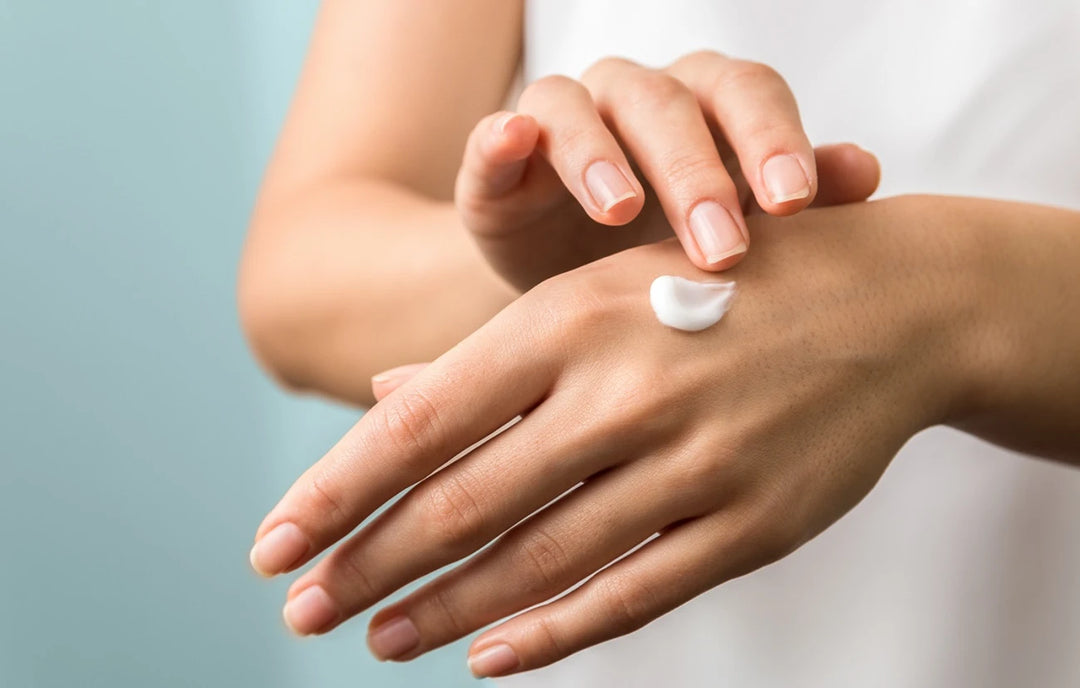Dermatologist’s Tips for Chapped Hands

Learn how to heal dry hand skin
Do you need to heal dry skin and chapped hands? Hand chapping is called irritant hand dermatitis - and it's common.
Why does irritant hand dermatitis happen?
Skin lipids and keratin protein are lost from hand skin due to harsh exposures. This leads to a loss of crucial hand skin barrier integrity. The weakened skin barrier continues to lose lipids and suffer damage to the important keratin barrier protein as it is re-exposed to the harsh conditions that started the process.
Examples of irritant exposures that cause irritant hand dermatitis include:
- Harsh soaps used for hand washing, doing the dishes or washing other items without wearing gloves; and
- Chemicals such as solvents, alcohol, bleach, house cleansers, etc.
Irritant hand dermatitis typically burns and hurts.
The more weakened your skin barrier is, the faster the pain and burning happen. Even relatively weak exposure to irritating conditions can cause hand chapping when the skin barrier is compromised. Your skin can become extremely dry and cracked on your hands leading to fissures that bleed and sting. It’s why taking good care of your hand skin is so important.
Weakened skin with irritant hand dermatitis is also more prone to allergic hand dermatitis reactions.
This is because allergens penetrate into the damaged skin more efficiently than healthy skin. The most common allergens include fragrances and preservatives in hand care products. Yep, the products you grab to help your hands can end up hurting if they are filled with allergens! Allergic hand dermatitis usually itches.
There is also a myriad of other allergens that you may get your hands into such as:
- Plants (Philodendrons, English ivy, primrose, Alstroemeria flowers, tulips, chrysanthemums, and many other flowers and plants. Many trees also contain potent allergens that cause allergic hand dermatitis.
- Fruits and veggies that you touch when you cook and prep meals.
- All sorts of chemicals including hair styling products, hair dye and permanent wave solutions, paints, glues and the list goes on.
- Rubber gloves.

Yes, even the gloves you wear to protect your hands from exposure to irritants can cause an allergic reaction that feels like dry hands from wearing gloves! - Dermatologist Dr. Bailey
It's really important to avoid becoming allergic to things you commonly touch, which is why you want to take good care of your hand skin so that it can resist the penetration of allergens.
How do you heal irritant hand dermatitis (aka dry skin on your hands)?
- Use only mild fragrance-free soaps to wash your hands and be sure to rinse all soap residue off completely. Retained soap residue will continue to dry out your hands! Use only hand soaps that are particularly easy to rinse off such as my Naturally Best Bar Soap. This fragrance-free natural bar soap is free from botanical allergens and chemicals notorious for causing 'dry chapped hands'. Keep a bar of this eco-friendly and economical Natural Bar Soap at every sink where you most commonly wash your hands.
Dermatologist's tips for the best way to wash your hands to prevent chapping:
- Use warm, not hot water.
- Apply soap to the palm side only unless the back of your hands are truly soiled.
- Lather the palms well, avoiding working the soap onto the back of your hands where skin is thinner.
- Rinse well, being particularly careful to get all soap residue off from the web spaces between your fingers and under your rings. Irritant dermatitis usually starts in these areas!
- Apply a really good hypoallergenic moisturizer IMMEDIATELY after toweling hands dry. Do it often to keep hands healthy. To heal severe chapping, do it after every hand washing.
Tips for getting the best results from your hand moisturizer:
- To keep from having a slippery grip, use a non-greasy hand moisturizer. Remove excess moisturizer with a towel or paper towel or rub the lotion up on your forearm skin, it’s usually prone to dryness too!
- Some moisturizers contain ingredients that act as a protective barrier, sort of like gloves in a bottle. These ingredients are in the silicone family and include such names as dimethicone. My Dry Skin Hand Cream is an excellent example.;
- Be sure to use hypoallergenic moisturizing creams and lotions. Don’t pick a product with heavy fragrance - including 'natural' botanical essential oils - the most common allergens to worry about.
Wear gloves to protect your hand skin!
Gloves are a great way to protect your hands. Wear them outside when the weather is cold, windy and chapping. When you plan to expose your hands to harsh house cleaners, soaps or solvents, wear rubber gloves.
When you make a point to take good care of your hands, they will take care of you. With this in mind, I have 2 hand care kits to help you have healthy hand skin:

Survival Kit for Busy Hands
This kit includes my Foaming Natural Hand Cleanser and my beloved silicone containing Dry Skin Hand Cream. This Hand Cream is formulated by a brilliant skin care chemist and contains dimethicone (a form of silicone) and glycerin - like gloves in a tube but never greasy.
I'm totally obsessed! It's deeply hydrating and makes my hands feel so incredibly soft. What I love most is that I've never found a hand cream before that is so completely non-greasy, I can't even tell I have it on. It's like wearing with weightless, invisible gloves. I can truly say, with confidence, that this is the best hand cream I've ever tried. P.J.
I personally keep these products by my kitchen sink. At work, I keep the soap by each exam room sink in my medical office and the cream in my lab coat pocket. This product combo is a game changer to heal and prevent dry hand skin.
Dry Hand Skin Repair Kit
This is the kit to end all kits when it comes to healing severely chapped hands.
This kit includes the Foaming Hand Soap and Dry Skin Hand Cream plus Bag Balm and the best cotton gloves ever.
When you generously apply Bag Balm to your hands at bedtime and cover them with cotton gloves, you’ll wake up with hands that are much-improved. Do this little extra therapy step until your chapping has healed and then as needed to maintain healthy hand skin.
Take good care of your hands with dermatologist-recommended skin care and you'll avoid chapping, burning and uncomfortable hand skin!
Author: Dr. Cynthia Bailey M.D. is a Board Certified dermatologist practicing dermatology since 1987. She has done well over 200,000 skin exams during her career and authors the longest running physician written skin health blog in the world.
“I love empowering people to take good care of their skin by educating them and putting the ‘self-care’ into their skin care so that they love the skin they’re in!” Dr. Bailey



